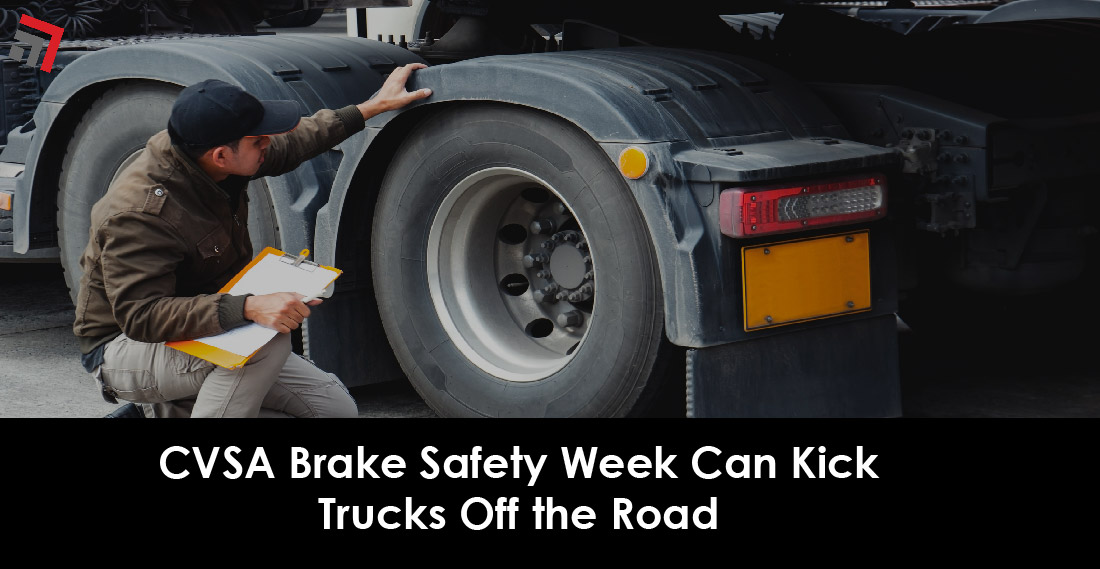The Commercial Vehicle Safety Alliance’s annual Brake Safety Week will take place from Aug. 25-31 this year.
The upcoming week is an enhanced law enforcement initiative with an acute focus on brake-safety awareness in fleets and professional truck drivers. In other words, trucking stakeholders will see an uptick in brake-related inspections. For fleet managers or truck drivers who are irreverent, or at least ignorant, when it comes to vehicle maintenance, their vehicles are at a higher risk of being taken out of service if brake violations are discovered.
Brake violations are trucking’s most common violation
Each year, a different emphasis is placed on Brake Safety Week. This year’s installment zeroes in on the condition of brake linings and pads. Inspectors will be looking for excessive wear or cracks in these two components.
According to CVSA, Brake Safety Week in 2023 resulted in 12.6 percent out-of-service violations.
In preparation for the week of Aug. 25, trucking companies and drivers should grow as a rigid practitioners of pre- and post-trip inspections, while also emphasizing preventive maintenance to avoid problematic wear-and-tear before it happens.
In CVSA’s International Roadcheck, a three-day enhanced inspection initiative which occurs annually in the spring, brake violations are the most common culprit behind out-of-service rulings. Last year’s Roadcheck, bad brakes comprised 25.2 percent of all vehicle out-of-service violations. In other words, this represents one-fourth of all violations, a remarkable feat considering Roadcheck is a general assessment of trucking’s operating standards and not just focused on braking systems alone.
If one were to affix a metaphor of the trucking industry’s inspection saga, the Achille’s heel of its performances is the dreaded brake violation.
Service perspective: Choose a trusted carrier (or let Commerce Express choose one on your behalf)
CVSA’s Brake Safety Week as well as Roadcheck emphasize the impacts of when trucking companies shirk their commitment to vehicle safety and maintenance standards.
Every year, a fair number of loads, the property of unaware shippers or receivers, are indefinitely suspended in transit as the truck carrying them is deemed unfit to continue its route. Essentially, the cargo becomes collateral damage, caught in crosshairs over poor operating standards of the hired service provider.
While even the most prepared of supply chain professionals can expect a surprise from time to time, most stakeholders find themselves in a situation like this due to a shaky, or even, lack thereof, vetting process. They may fail to check or simply overlook “red flags”. To name a few: a carrier having a poor safety rating and inspection history; a carrier not having sufficient cargo and liability insurance; and, not considering a truck driver’s hours-of-service compliance and driving history.
Supply chain professionals may also benefit from scouring online reviews and industry word-of-mouth when vetting their carriers. Admittedly reviews rarely tell the whole story and are often biased or minced, but if there’s enough volume of feedback, whether positive or negative, the insights will provide a better understanding of the carrier’s reputation and service quality.
As an intermediary (freight broker), Commerce Express Inc. is trusted by its clients to award their cargoes to a vetted pool of trucking companies. For 40 plus years, Commerce Express has forged trusted relationships with a variety of transportation vendors. From small trucking businesses and owner-operator drivers to large fleets and Class I railroads, Commerce Express Inc. has found strategic allies in all corners of supply chain services.
How does Commerce Express Inc. vet and choose the right trucking companies for its clients?




Recent Comments